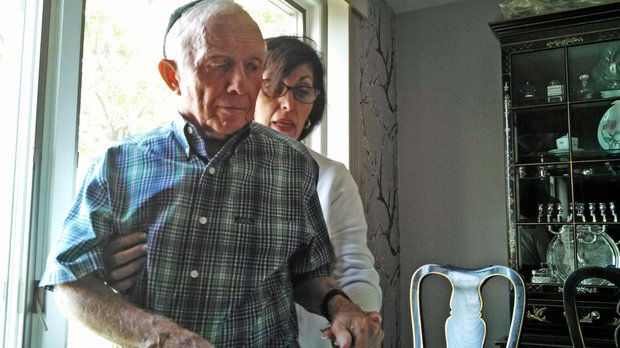By Mark D. Stein Staten Island Advance

Albert (Albee) Reingold and his wife, Gertie, believe his health began to deteriorate shortly after he was exposed to toxic smoke on the morning of September 11, 2001. (Staten Island Advance/Mark Stein)
STATEN ISLAND, N.Y. — From the second story of his Washington Avenue home in Meiers Corners, a seated Albert (Albee) Reingold stares out the window toward the street, wondering what people are doing as they walk by and where they are going.
He was once an active neighborhood resident who often visited Young Israel of Staten Island. Reingold, 76, loved to walk the community of Meiers Corners. He loved having fun, playing tennis, and keeping busy.
Today, he can simply sit and is unable to move on his own, nor can he regularly speak with clarity.
On September 11, 2001, he was seated on a Manhattan-bound express bus when he and other passengers saw smoke coming from the World Trade Center. The bus entered the Brooklyn–Battery Tunnel — now officially known as the Hugh L. Carey Tunnel — and as it nosed forward, the tunnel filled with more smoke, forcing the bus to a complete halt, along with other vehicles in the tube.
“They didn’t know what was going on,” said Reingold’s wife, Gertie, 68.
The bus remained in there for a “few” hours, said Mrs. Reingold. She couldn’t contact her husband. Eventually, the bus driver let the passengers out, and when they got out of the vehicle, “They could not see their arms in front of them [because of the smoke],” said Mrs. Reingold, recalling what her husband told her when the incident happened. “People were passing out. They were choking.”
The Manhattan side was blocked off, prompting Reingold to go back toward Brooklyn, where he eventually was able to contact his wife, who signaled to her nephew, a Brooklyn resident, to pick up Reingold and take him to his home.
CHANGES BEGAN
A day later, the first of many changes that would come within the following decade appeared.
“He already was feeling stuff going on,” said Mrs. Reingold.
The couple visited a doctor because Reingold had breathing problems.
Within a week or so, the then-64-year-old man returned to work as an elevator manager via the same tunnel that he was stranded in on September 11. He didn’t want to go through it.
“We didn’t realize the effect it was having on him. Several months later, he started to not be able to concentrate at work properly,” said Mrs. Reingold.
He was laid off due to down-sizing sometime later.
In March 2002, Reingold suffered two strokes.
“That really did him in,” said his wife. “That was the beginning. He had problems with his breathing, his sinuses, his eyes burned.”
He underwent occupational therapy, speech therapy, swallowing therapy and saw other doctors.
“Little by little, all of these symptoms were going off. Over the years, things got worse. His walking got worse. We thought he was a stroke victim and said he was getting older and this is what’s happening,” said Mrs. Reingold.
In February 2011, while walking up the stairs, Reingold fell from the top step and tumbled down several. The couple thought it was a stroke. It was definitely the end of his ability to walk freely, said Mrs. Reingold.
He’s also since lost the ability to talk or move on his own.
He was shortly diagnosed with vascular parkinsonian, which affects the mind and body. Mrs. Reingold said the doctor explained that the illness had been brewing in his body for 10 years.
“Exactly 10 years after 9/11 is when this came out like this, and he was totally incapacitated,” she said.
Reingold now requires the assistance of a nurse’s aide and his wife around the clock.
According to the National Institute of Neurological Disorders and Stroke (NINDS), a number of disorders can cause symptoms similar to those of [Parkinson’s disease] (PD). People with symptoms that resemble PD but that result from other causes are sometimes said to have parkinsonism.
Mrs. Reingold believes toxins from the smoke that Reingold inhaled while in the tunnel on September 11, 2001 directly led to his illness.
The NINDS website states “some toxins — such as manganese dust, carbon disulfide, and carbon monoxide — can cause parkinsonism.”
TOUGH GO
Mrs. Reingold said the situation has been tough.
“Money has been a huge problem,” she said. “It’s basically wiped us out.”
They’ve been able to afford medicine and medical bills through federal assistance, including Medicaid.
“We don’t do anything. We don’t go anywhere. I could never go out to eat with him, go to a show with him, sit through a movie,” she said. “My life is taking care of him.”
Mrs. Reingold plans to move to Israel by the end of this year to be closer to her children.
“It would be an impossible trip if I waited any longer,” she said, adding that her Washington Avenue home of 40 years has been sold. “Believe me, I love this neighborhood. I’m happy in this house. I would not be looking to make any changes if he was able to get around, but he can’t. I don’t have the strength to continue. I’m afraid of where this is going, and I need to be with my kids.”
In the meanwhile, she’s recently explored filing for the September 11th Victim Compensation Fund (VCF).
The couple will celebrate their 51st wedding anniversary on Thursday (tomorrow). Mrs. Reingold said if the situation was reversed, her husband would do whatever is possible to take care of her.
While he is barely able to speak, Reingold managed to voice his appreciation for the woman he married just a couple months after she graduated high school in 1962.
“She has done a lot for me,” he said. “If not for her, I wouldn’t be living. I wouldn’t exist.”

